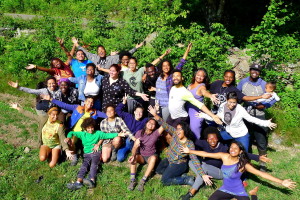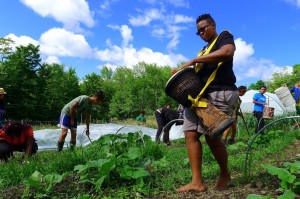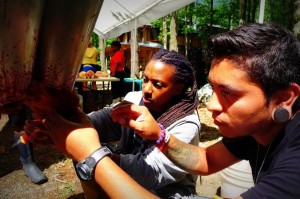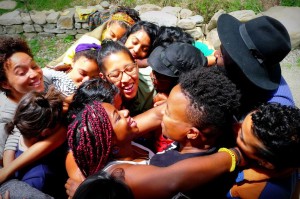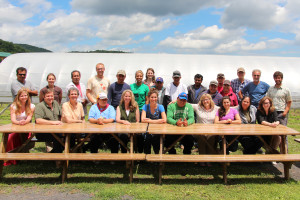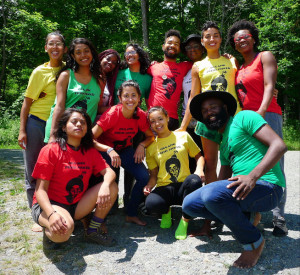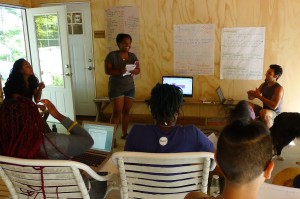Soul Fire Farm Love Notes #4, July 6, 2016
By: Leah Penniman
- Contents of Share
- Announcements
- Recipe
- Farm and Food Justice News – it’s worth it to scroll down!
Black and Latinx Farmers Immersion (BLFI) Session 1, Last Day Joy (scroll down for the story)
CONTENTS OF SHARE
Sugar snap peas (¾ pound)
Purple top turnips (1 bunch)
Garlic scapes (1 bunch)
Lettuce mix (⅜ pound)
Braising mix – mustard greens for cooking (¼ pound)
Winterbor kale (1 large bunch)
Scallions, young (1 bunch)
Bok Choy (1 large head)
Optional: Mung bean, lentil sprout mix (1 quart)
Reminder: If you ordered chickens, they are coming TODAY!
- ANNOUNCEMENTS
PASTURE-RAISED CHICKEN. We have about 10 chickens left from our first batch if you are interested in ordering. They can be picked up on the farm or delivered on our normal Wednesday farm share delivery route. You can pay using EBT/SNAP. Signup HERE
We will be offering these delicious whole chickens two more times this season. Chickens are raised on pasture, all natural, young and tender. They are $4.25 per pound. Birds dress out at 4-6 pounds. We will have 50 birds for sale in late July and mid August. Signup HERE.
EGGS and SPROUTS. For those of you who ordered eggs with your shares, we expect them to be available in mid-July.
COMMUNITY DAYS. 8-1 Work and learn together. 1-2:30 Potluck lunch. July 17, September 24, October 22, and November 12. RSVP here.
RETURN YOUR BOXES please. You can leave them where you get your delivery. If you break them down, please make sure not to tear or bend any of the tabs, or just leave the assembled box for us and we are happy to break it down.
WASH YOUR VEGGIES. We DO NOT extensively wash veggies before delivering them to you. We will do some washing if there is a lot of dirt on greens and we always rinse root crops. In general, this allows the food to stay fresher longer. It also means you need to wash your veggies before consuming them. For greens: fill a bowl with cold water. Soak greens in water for a minute. Drain water and repeat two more times. Dirt will rinse to the bottom. Bugs should float to the top.
Percussion in the Fields, BLFI
RECIPE – Grilled Garlic Scapes
Ingredients
- Large bunch of garlic scapes
- 1 tablespoon olive oil
- black pepper, to taste
- sea salt, to taste
Instructions
- Heat your grill to a medium to low flame.
- Wash and dry your scapes. Break off the harder ends {as you would like asparagus} and leave whole.
- Massage the scape with oil and sprinkle it with salt and pepper. Toss them onto the grill and brown both sides, remove them when they’re soft on the inside, crispy on the outside, a lighter shade of green and golden brown in parts.
- Serve the scapes hot with more fresh pepper.
Source: www.withfoodandlove.com
- FARM AND FOOD JUSTICE NEWS
We have been uprooted from our land. As African-Americans, many of our ancestors were stolen from West Africa to be sold into slavery. As Latinxs, they were forced out of Mexico by international trade deals like NAFTA and into exploitative farmworker arrangements. As First Nations people, they were driven to walk the Trail of Tears. Some of our ancestors put down roots in new soils. For more than 400 years they tilled the red earth of the American South, while others joined the ranks of “foreign-born” agricultural workers. Our ancestors built the foundation for this country’s wealth and power.
We knew the land and belonged to the land, but the land did not belong to us. Brutal racism—maiming, lynching, burning, deportation, economic violence, legal violence—ensured that our roots would not spread deeply and securely. For decades, the U.S. Department of Agriculture discriminated against Black farmers,excluding them from farm loans and assistance. Meanwhile, racist violence in the South targeted land-owning Black farmers, whose very existence threatened the sharecropping system. In 1910, at the height of black land ownership, 15 million acres of farmland—14 percent of the total—was owned and cultivated in the black community, according to the PBS series “Homecoming.” Now, less than 1 percent of farms are black-owned.
We are working to correct that injustice.
Learning how to transition and process chickens at BLFI
The Black and Latinx Farmers Immersion is an intensive farming and food justice “tribe of liberation” that comes together at Soul Fire for a week of learning and healing. We just finished up our first session, with 20 participants, plus “train the trainers” and facilitators. From 6:30 AM until 10 PM every day we moved from collaboratively prepared meals, to field work, to a session on soil ecology, a workshop on farm economics, spiritual bath, permaculture classes, and dozens of other learning experiences.
It is an honor to be a part of this powerful, beyond-words, community. Here are a few wisdom pearls dropped by some of the participants.
“This was five lifetimes in one day.
“Every smile, every conversation, every hug gives me life.
“I was about to quit farming and I feel renewed. I got to experience for the “first time” something I have done 100 times.
“I am ready to spread the seeds of this experience back in my community.
“We are thriving, not just surviving. Allowed to be vulnerable and caring.
“Our ancestral connection is deepened.
“Another world is possible.
Group hug before saying “goodbye” at BLFI
This coming weekend we start our second immersion of the season, this one focussed on ending racism and tailored to people with systemic privilege. It will be our first time running this program and we have a power team of experienced facilitators coming to join us, including Ava Bynum, Jonathan McRay, Owen Taylor, and Ellen Tuzzolo.
We are also excited to welcome dozens of youth groups to the farm this summer, starting this week with young folks from Bed Stuy Campaign Against Hunger and the Bronx public schools. Photos and descriptions will be shared next week!
Forging relationships with other leaders in the food justice movement is high on our list of priorities as well. Just yesterday, Leah got to collaborate with the farmers at Hudson Valley Farm Hub, presenting on the work of Soul Fire Farm (in Spanish!) and getting to know their farm and training initiatives. This is the beginning of an ongoing series of workshops and dialogues on how to work toward food sovereignty in the Hudson Valley Region. (Check out their ProFarmer training program, now accepting applications.)
We have also been working with Goddard College and can now offer college credit for our training programs! The hope is that this option will increase accessibility of college credit for our community.
Speaking of forging collaborations, we hope you can join us for our keynote and workshop at the NOFA Summer Conference, August 12 and 13. There are scholarships available and the deadline is July 15.
Post-lunch chilling with farmers at Hudson Valley Farm Hub, Photo credit: Hudson Valley Farm Hub
Of course, the farm is the foundation of all we do and the place where most of our time is dedicated. Cheryl, Ravonne, and Hannah have been taking turns managing the farm operations for one week at a time and are doing an amazing job. We have been expanding our use of nitrogen-fixing cover crops under the tomatoes and squash, and managing our micronutrients to increase beneficial mycelium in the soil. The crops are healthy, but so are the weeds! We finally have a seed-free batch of straw from a local farmer and are working hard to get the entire farm under a fresh layer of mulch.
Repping some seriously cute t-shirts designed by Naima Penniman.
Farm economics workshop in the packing barn/classroom/dance party space, BLFI

